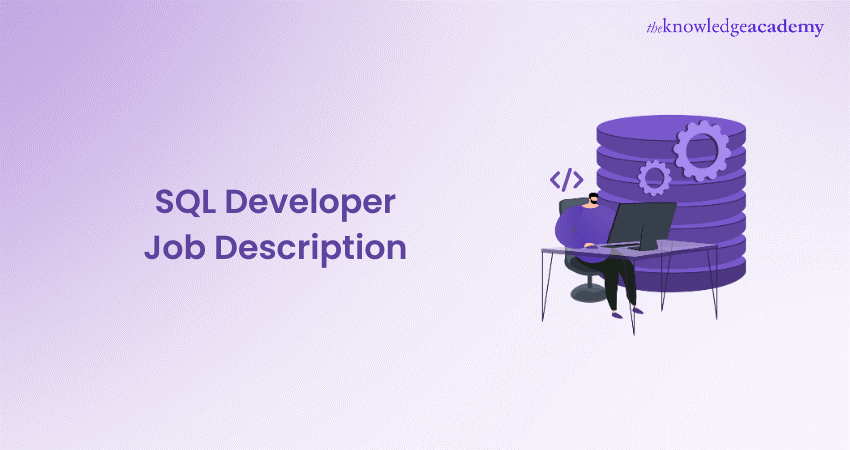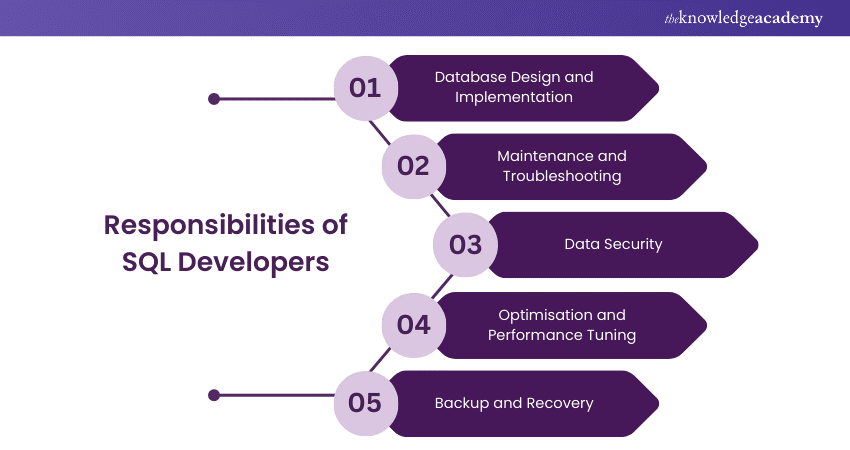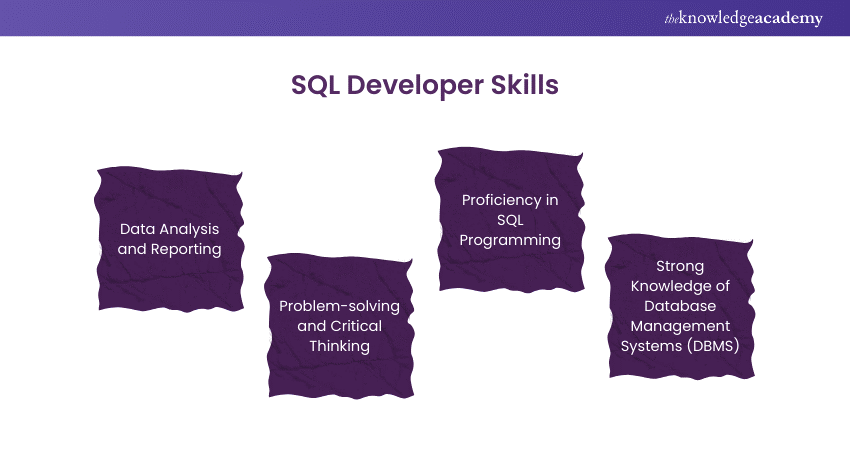We may not have the course you’re looking for. If you enquire or give us a call on +60 1800812339 and speak to our training experts, we may still be able to help with your training requirements.
We ensure quality, budget-alignment, and timely delivery by our expert instructors.

SQL Developers play a vital role as the backbone of data-driven decision-making in modern businesses. Are you ready to explore the evolving landscape of SQL development? Let's explore the dynamic world of SQL development and discover how these professionals shape the future of data utilisation in organisations through the SQL Developer Job Description.
SQL Developers create and maintain systems managing vast data, requiring deep database management and development understanding. To maintain data security and integrity, this role requires careful, analytical processing of complicated data structures. Let's delve deeper into the intricacies of SQL Developer Job Description to grasp their vital contributions in modern organisations.
Table of Contents
1) Who are SQL Developers?
2) Role of an SQL Developer
3) Responsibilities of SQL Developers
4) SQL Developer Skills
5) Example of SQL Developer’s Job Description
6) What are the Future Prospects of SQL Developers?
7) Conclusion
Who are SQL Developers?
SQL Developers are specialised software professionals who focus on designing, implementing, and maintaining database systems using SQL. They play an important role in managing and organising data, ensuring that it is accessible, accurate, and secure. Businesses are depending more and more on data to support their strategic decisions, SQL Developers are integral to processing and retrieving necessary information.
Role of an SQL Developer
An SQL Developer's primary role is to develop SQL databases and write applications to interface with SQL databases. They also modify and optimise existing databases to improve performance and functionality.
Their work is important for enabling organisations to handle vast amounts of data efficiently and effectively. SQL Developers collaborate with other IT professionals, such as data analysts and system administrators, to ensure seamless data flow within the organisation.
Advance your SQL expertise with our comprehensive Advanced SQL!
Responsibilities of SQL Developers
The responsibilities of an SQL Developer vary based on the organisation’s size, the complexity of the database, and the specific needs of the business. However, some of the common duties include:

a) Database Design and Implementation: Creating robust database structures that support the storage and retrieval of data without loss of integrity or speed.
b) Maintenance and Troubleshooting: Regularly update databases to accommodate changes in business requirements and ensure smooth operation.
c) Data Security: Implementing and maintaining security measures to protect data against unauthorised access and threats.
d) Optimisation and Performance Tuning: Analysing and tuning databases to handle additional load and perform efficiently under all conditions.
e) Backup and Recovery: Establishing data backup and recovery protocols to prevent data loss and ensure data availability after any data loss incident.
Transform your SQL proficiency with our specialised Introduction To SQL Training for optimal career growth!
SQL Developer Skills
Here are the essential SQL Developer skills:

1) Data Analysis and Reporting
Data Analysis and reporting are essential skills for SQL Developers, as they enable the extraction of meaningful insights from complex data sets. These professionals are responsible for not only analysing data but also designing and managing reports. Such reports assist various departments within an organisation to make data-driven decisions.
Effective reporting by SQL Developers helps streamline operations. It aids in identifying trends and supports strategic initiatives based on accurate and timely information. This ensures that organisations can respond swiftly and efficiently to market changes and operational challenges.
2) Problem-solving and Critical Thinking
Problem-solving and critical thinking both are crucial skills for SQL Developers, who often encounter challenges that impact database performance or functionality. They must swiftly diagnose issues and strategise effective solutions to maintain optimal database operations.
Critical thinking enables them to assess various potential solutions, considering the advantages and disadvantages of each to determine the most suitable approach. This process requires technical expertise and analytical thinking about the solution's impact on system efficiency and reliability. These skills ensure that developers can uphold and enhance database integrity and performance.
3) Proficiency in SQL Programming
A deep knowledge of SQL is fundamental for SQL Developers, as it enables them to write and optimise complex queries essential for database operations. Proficiency in SQL allows developers to effectively manage and manipulate large data sets, ensuring data retrieval and storage processes are optimised for performance.
This skill is crucial in enhancing database efficiency and supporting the scalability of applications that rely on robust data management. Thereby, it drives business growth and operational success.
4) Strong Knowledge of Database Management Systems (DBMS)
SQL Developers must have a thorough understanding of various Database Management Systems (DBMS) such as MySQL, Oracle, and Microsoft SQL Server. This knowledge is vital for effectively designing, implementing, and managing database systems.
Familiarity with DBMS at all levels lets developers utilise specific features, ensuring optimal system configuration and maintenance. This expertise also enables them to adapt to different environments and meet various organisational needs. Additionally, it equips them to innovate and improve system architectures to meet future data demands effectively.
Master SSRS with SQL Server Reporting Services (SSRS) Masterclass for advanced data visualisation and reporting skills!
Example of SQL Developer’s Job Description
Sample SQL Developer Job Description:
|
Title: SQL Developer Location: [Insert Location] Company: [Insert Company Name] Job Type: Full-time Salary: [Insert Salary Range] Description: We are seeking a skilled SQL Developer to join our dynamic team. The ideal candidate will be responsible for developing, implementing, and maintaining database systems using SQL. The role entails designing and optimising database structures, ensuring data integrity and security, and collaborating with other IT professionals to facilitate seamless data flow within the organisation. The SQL Developer will also be involved in data analysis and reporting, supporting various departments in making data-driven decisions. The successful candidate must possess strong analytical skills, proficiency in SQL programming, and a thorough understanding of database management systems. Experience in cloud computing, big data analytics, or artificial intelligence is a plus. If you are passionate about leveraging data to drive business success and thrive in a fast-paced environment, we encourage you to apply. Responsibilities: 1) Develop, implement, and maintain database systems using SQL. 2) Design and optimise database structures for efficient data management. 3) Ensure data integrity and security through regular monitoring and updates. 4) Collaborate with other IT professionals to ensure seamless data flow within the organisation. 5) Conduct data analysis and reporting to support decision-making processes. Requirements: 1) Bachelor's Degree in Computer Science, Information Technology, or related field. 2) Proven experience as a SQL Developer or similar role. 3) Proficiency in SQL programming and database management. 4) Strong analytical and problem-solving skills. 5) Familiarity with DBMS such as MySQL, Oracle, or Microsoft SQL Server. Join our team and be part of a dynamic environment where your skills and expertise will make a significant impact on our organisation's success. Apply now! |
What are the Future Prospects of SQL Developers?
The career prospects for SQL Developers are highly promising, given the central role of data in modern business strategies. As organisations across various industries continue to leverage big data, the need for qualified experts who can design, maintain, and optimise databases is increasing. SQL Developers are pivotal in implementing data solutions that help companies make informed decisions, manage operational efficiency, and enhance customer experiences.
Moreover, the evolution of technology is broadening the scope of opportunities for SQL Developers. The integration of Cloud Computing and the rise of technologies like machine learning and artificial intelligence are creating new avenues for data management and analysis. SQL Developers with skills in these areas are particularly valuable, as they can manage more complex data structures and derive deeper insights from massive datasets.
Discover MySQL fundamentals for efficient database management with our Introduction To MySQL Course and unlock new career opportunities!
Conclusion
The SQL Developer Job Description outlines a role that is essential to the fabric of virtually any data-intensive business today. From ensuring seamless data flow to enabling sophisticated Data Analysis, SQL Developers contribute profoundly to their organisations' success. For skilled and forward-thinking individuals, SQL Developer careers offer promising growth and innovation opportunities.
Learn the essentials of SQL databases with our Introduction To SQL Databases Training 10985C by Microsoft SQL Server experts!
Frequently Asked Questions
What is the Career Path of a SQL Developer?

An SQL Developer typically starts as a Junior Developer. They then advance to a Senior Developer. Finally, they may progress to roles like Database Administrator, Data Engineer, or Business Intelligence Analyst.
Where do SQL Developers Work?

SQL Developers work in various industries such as technology, finance, healthcare, and e-commerce. They are employed by companies of all sizes, including startups, corporations, and government agencies.
What are the Other Resources and Offers Provided by The Knowledge Academy?

The Knowledge Academy takes global learning to new heights, offering over 3,000 online courses across 490+ locations in 190+ countries. This expansive reach ensures accessibility and convenience for learners worldwide.
Alongside our diverse Online Course Catalogue, encompassing 19 major categories, we go the extra mile by providing a plethora of free educational Online Resources like News updates, Blogs, videos, webinars, and interview questions. Tailoring learning experiences further, professionals can maximise value with customisable Course Bundles of TKA.
What is the Knowledge Pass, and How Does it Work?

The Knowledge Academy’s Knowledge Pass, a prepaid voucher, adds another layer of flexibility, allowing course bookings over a 12-month period. Join us on a journey where education knows no bounds.
What are Related Management Courses and Blogs Provided by The Knowledge Academy?

The Knowledge Academy offers various SQL Courses, including Introduction To SQL, Advanced SQL, SQL Server Reporting Services (SSRS) Masterclass and Introduction To MySQL Course. These courses cater to different skill levels, providing comprehensive insights into SQL Array.
Our Programming & DevOps Blogs cover a range of topics related to programming, offering valuable resources, best practices, and industry insights. Whether you are a beginner or looking to advance your programming skills, The Knowledge Academy's diverse courses and informative blogs have you covered.
Upcoming Programming & DevOps Resources Batches & Dates
Date
 Introduction to SQL
Introduction to SQL
Fri 7th Mar 2025
Fri 23rd May 2025
Fri 18th Jul 2025
Fri 12th Sep 2025
Fri 14th Nov 2025
Fri 12th Dec 2025






 Top Rated Course
Top Rated Course



 If you wish to make any changes to your course, please
If you wish to make any changes to your course, please


